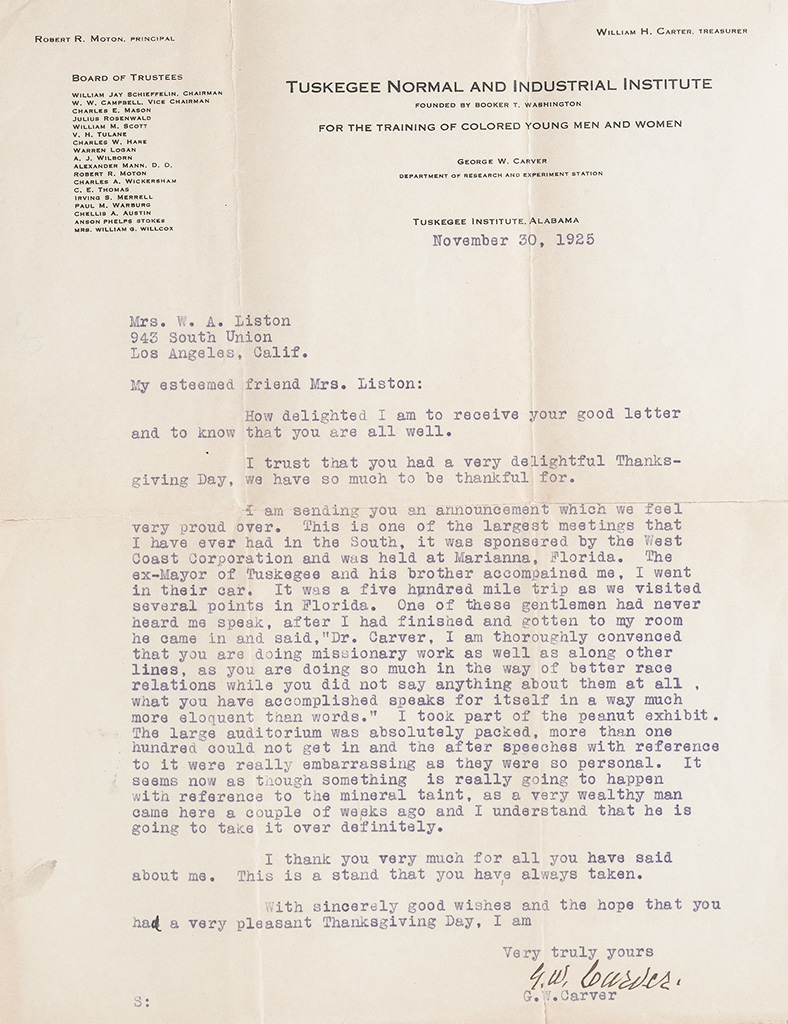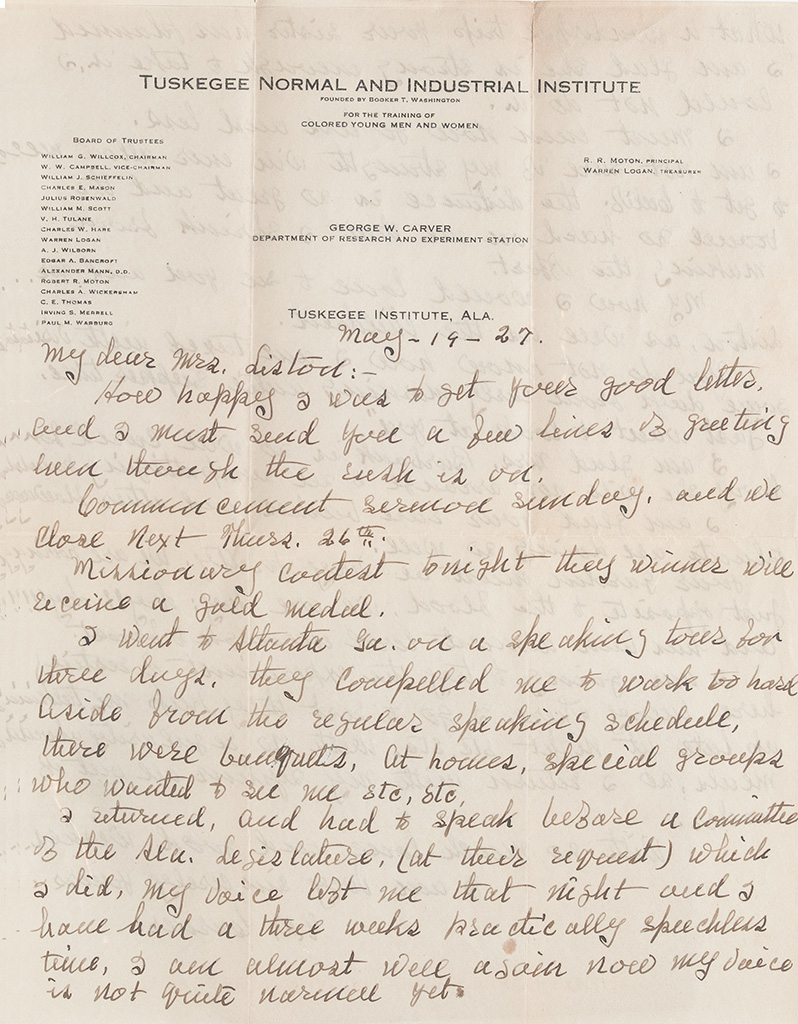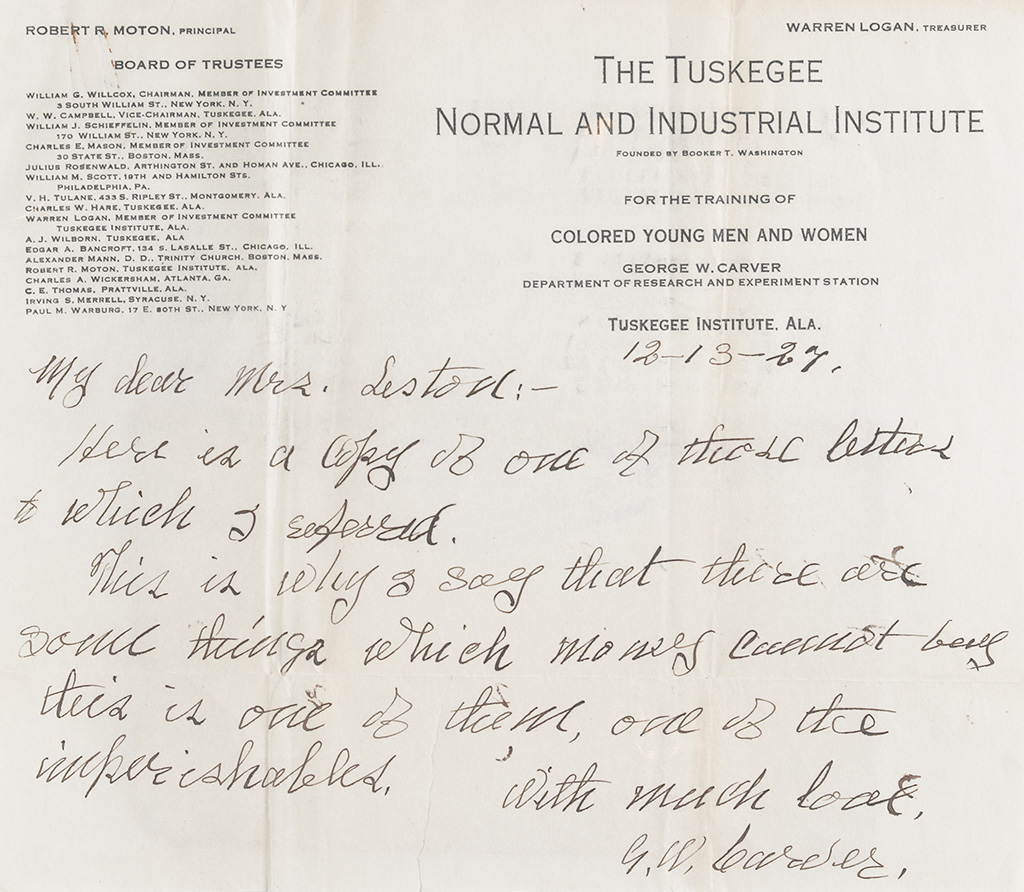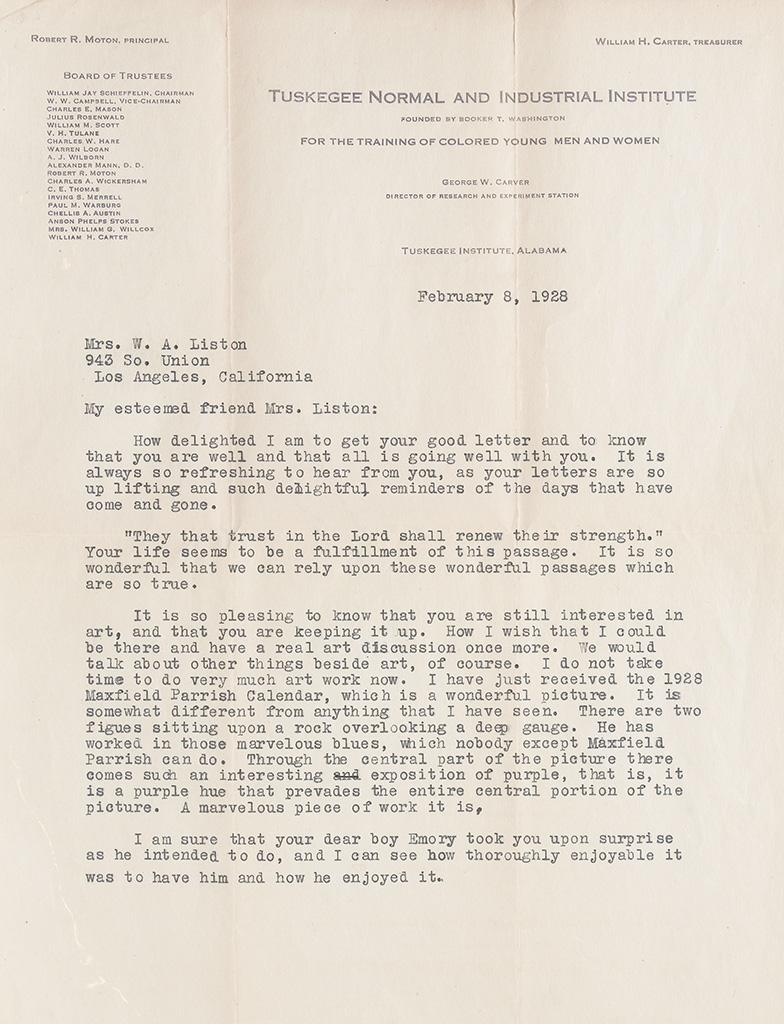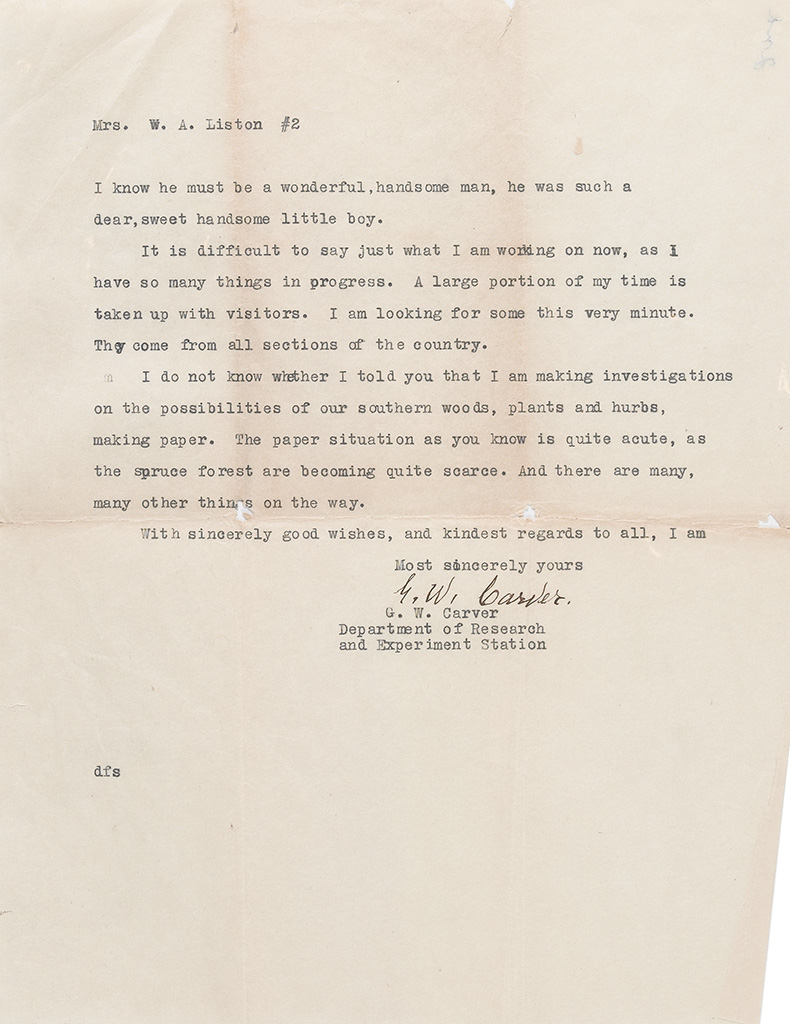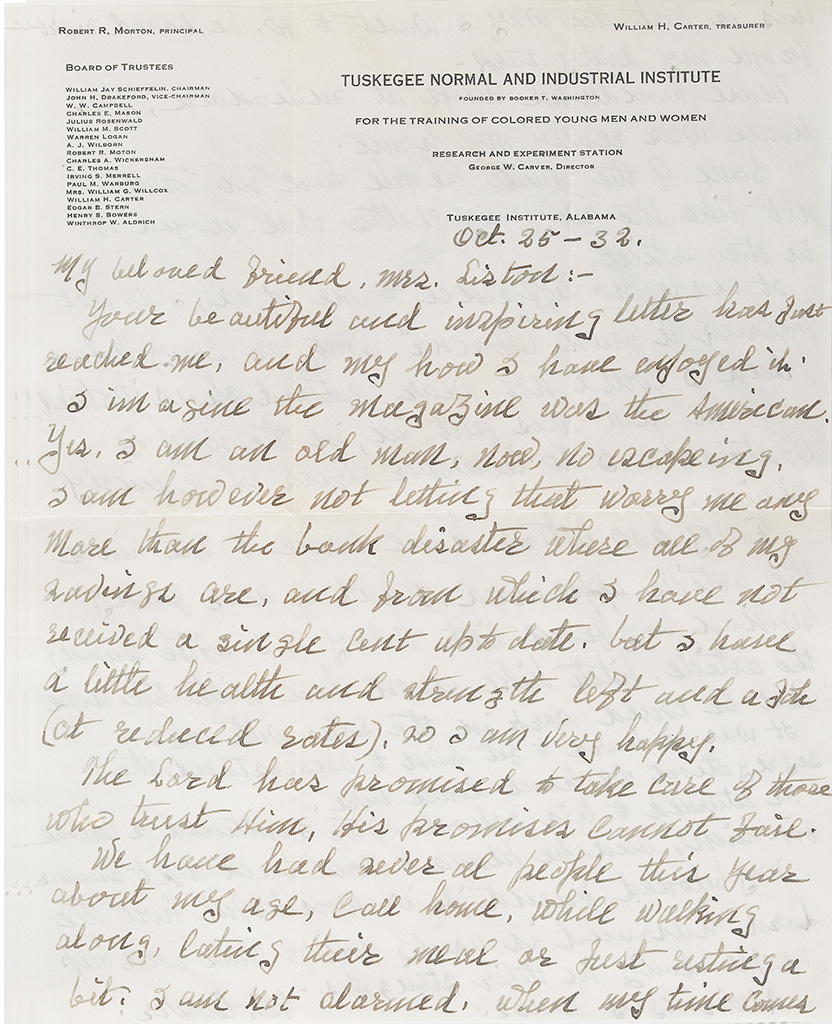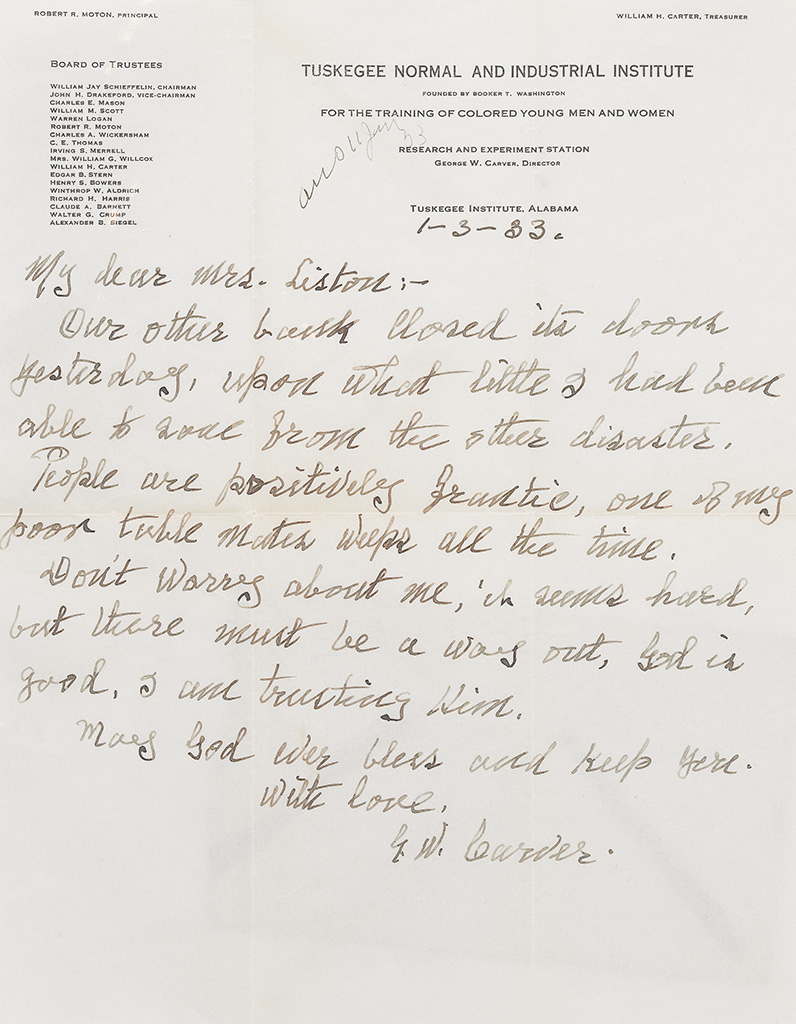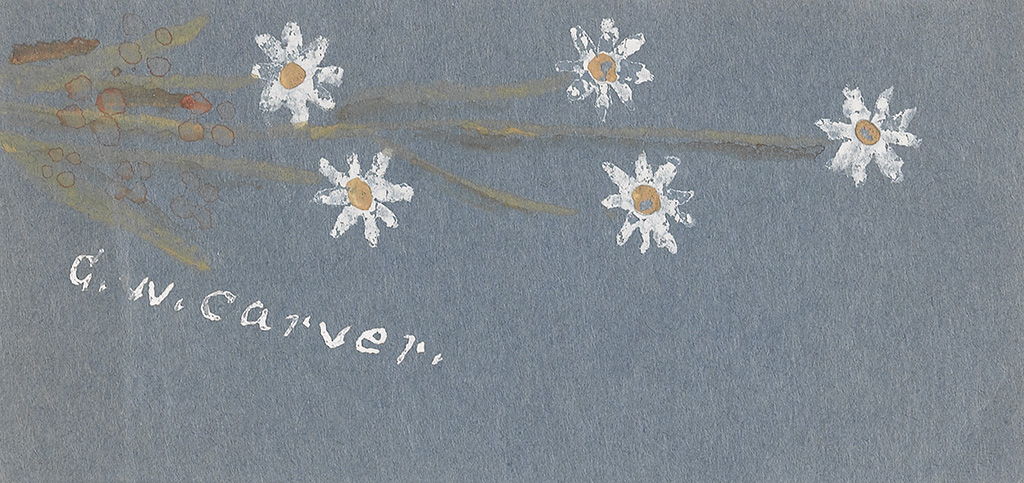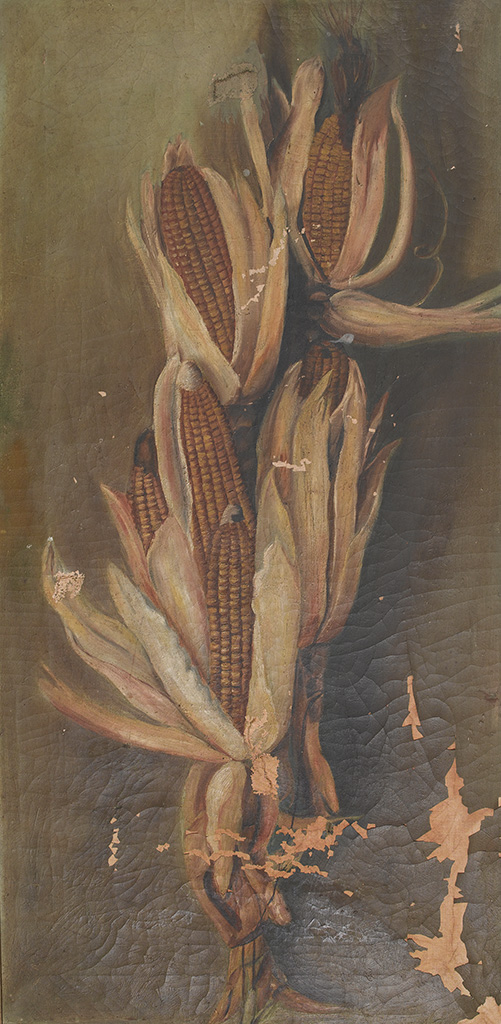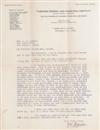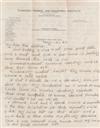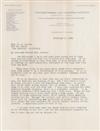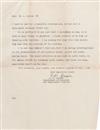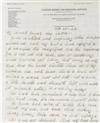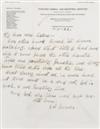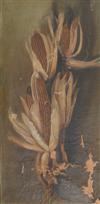Sale 2342 - Lot 280
Unsold
Estimate: $ 80,000 - $ 120,000
CARVER, GEORGE WASHINGTON. Archive of 97 Letters Signed, "G.W. Carver," to his friend Mrs. Sophie Liston, including 73 ALsS and 24 TLsS, on various topics including argicultural lecture tours, racism, conditions during the Great Depression, Tuskegee Institute life, Christian Science Church, national government policy, polio treatments, massage and oil therapy, painting, and gardening. Mostly 4to, most on "Tuskegee Normal and Industrial Institute" stationery; generally good condition. Most with original envelope. should be examined. Vp, 1925-37
Additional Details
Sophie Liston first met George Washington Carver in his first year at Simpson College in Indianola, Iowa. Carver had enrolled there to continue his education, particularly in the area of art. Sophie Liston, a local white woman was one of a few townspeople who befriended Carver, providing him with small jobs to earn some money, clothing and even helped him furnish the modest shanty where he lived. The two formed an immediate bond, and a friendship, based on religious faith and a mutual love of art that would last for many years. Sophie and her family eventually moved to California, but their friendship continued through letter-writing. We present a wonderful collection of letters through which Carver discusses his experiments with peanuts and peanut oil, among many subjects. Only a couple of letters touch on race, though not as a focus. Carver's own background is complex. Born into slavery and raised by a white family, Carver is comfortable as a member of both races. Carver discusses his work on the treatment of infantile paralysis at length, citing a problem he had with his knee and massages with peanut oil. One can trace the progress of Carver's career reflected in the letters, and the topic of his celebrity often appears. He writes of the Russians inviting him to come to the Soviet Union and a film documentary released to movie-houses nationwide. In addition to the letters, there is a large painting (18 x 36 inches) by Carver of a cornstalk that unfortunately has not survived the years as well as the letters, but it is no doubt restorable; and also a small floral watercolor (2 x 4-1.4 inches), no bigger than a large bookmark. 30 November 1925: ". . . This is one of the largest meetings that I have ever had in the South. . . . It was a five hundred mile trip as we visited several points in Florida. One of the gentlemen had never heard me speak, after I had finished and gotten to my room he came in and said, 'Dr. Carver, I am thoroughly conv[i]nced that you are doing missionary work as well as along other lines, as you are doing so much in the way of better race relations while you did not say anything about them at all, what you have accomplished speaks for itself . . . ' ."
11 October 1927: "Upon my return from Tulsa, Oklahoma, I found your good letter awaiting me. . . . I took the entire peanut exhibit and installed it at the Negro Fair there. Quite a large organization. This exhibit consists of 202 products. . . ."
8 February 1928: ". . . It is so pleasing to know that you are still interested in art . . . . I have just received the 1928 Maxfield Parrish Calendar . . . There are two figu[r]es sitting upon a rock . . . . He has worked in those marvelous blues, which nobody except Maxfield Parrish can do. . . . I do not know whether I told you that I am making investigations on the possibilities of our southern woods, plants and hurbs, making paper. The paper situation as you know is quite acute, as the spruce forest are becoming quite scarce. . . ."
7 October 1928: ". . . My exhibit will show fully fifty different things from which paper can be made. . . . Products from the much despised palm root of Fla. will be shown. Possibly dyes from the green persimmon. . . ."
22 November 1928: ". . . It will probably be 50 years after I have been called hence before the people can fully realize what a contribution to education the work I am doing is. Booker Washington is yet misunderstood by some, but with many there is a growing understanding. God has promised to take care of us, so I am not worrying . . . ."
17 June 1929: ". . . I am praying for that time never to come, when my work is finished here. I want to be called right from my work. . . .
"Our summer school is on and we have about 600 teachers so far, they are still coming in. . . ."
21 January 1930: ". . . No, peanut milk cannot be ex[tracted?] except through the person who has the patent rights. He is an Englishman and wants fifteen thousand dollars for the right to manufacture and a three percent royalty on every dollar made. Of course, my products are different from his, so that if I wanted to get into a long controversary [sic], it would be . . . expensive and consume much of my time. . . ."
7 March 1930: ". . . I do not think it the best thing to push the fruit fly matter further. Just remember that I am in the South, where colored people are 'Jim Crowed' practically everywhere. I would no doubt have no cooperation whatever from the other side. . . . I do not expect to see any change very radical in my life time. . . ."
26 June 1930: ". . . Just think what is meant to the dear old soul whose evening of life had come, no where to go, no one to give her a cup of cold water. You came as the good Samaratan, took her in, cared for her until the sun of her life had set. To my mind this act meant more than a thousand spectacular speeches or even the endowing of a university. . . ."
6 February 1931: ". . . I have just this minute finished reading an article . . . on 'Soviet Menace to the U.S.' It not only voices your sentiments exactly, but says much more. I think I am about as near Russia as I will be. . . . I shall let you know what the Russian representative says when he comes for the interview from N.Y. City. . . ."
". . . The Russian Govt. is urging me to go to Russia, in the interest of cotton growing. . . . [T]hey want me to stay six months and make a study of . . . the whole agrl. situation as well as the commercial possibilities of the country. . . . The depression is something terrible . . . . [W]e found the children of one family eating swill, it was all the food they had. . . ."
11 December 1931: ". . . The thing I am working on now is cotton road building material. Road experts say that they believe it will make a perfect road. Our governor [is] much interested and will send his expert . . . up to figure out the exact cost per mile as soon as I am ready. The public is very enthusiastic over it. . . ."
15 January 1933: ". . . I am trying to point the way out to some one almost every day. I am telling them to make lye hominy, salt rising bread, etc. etc. I taught one poor fellow (white) who has a family was out of work, how to make soap from waste fats etc. . . . He is doing nicely with it now and is very happy. . . ."
14 February 1933: ". . . If every one would live the Golden Rule way of life, we would soon lift the depression and have a prosperity never dreamed of before. . . ."
"19 March 1933: ". . . I so thoroughly agree with you that Mr. Roosevelt is going to make us a president that history will delight to point to with pride. His prayer for God's guidance before taking the oath pleased me greatly."27 March 1933: ". . . [I]f you get a chance to see the John Hix, 'Strange as it Seems' movie of myself in my laboratory, please go. He wrote me about a month ago that it was released to 6,000 theaters. He says it is excellent. I am anxious to see if you recognize me."
26 December 1933: ". . . The colored people suffer more than any other class under the NRA code at present. I am so glad to have you say what you have with reference to Mr. Roosevelt, he is a real Pres. and I believe he will lead us out safely. . . ."
[circa 1934]: "The special peanut oil to which you refer is not manufactured commercially, and will not be until I finish my investigations and get the range of its entire pharmaceutical possibilities. I have only used it on two cases of infantile paralysis, each of which shows decided improvement. . . . Use the oil on the slip . . . . I cured a bad case on myself with them years ago. Mine was in the knee, swelled terribly and the pain was almost unbearable, no sleep at night. I put the knee in a continuous heating pack at night and massaged night and morning with these oils, it cured me. . . ."
24 January 1935: ". . . I am just as busy as can be with 2068 special letters that are before me on infantile paralysis etc. besides the crowds which come to see me. I am getting some results that seem nothing short of miracles. The lame, through God are being made to walk. . . ."
20 March 1935: ". . . There is no Christian Science Church nearer than 42 miles of us and it is a white church so you see I could not go if I was there. You, my great friend, cannot understand what a terrible blight this prejudice is, but God will take care of it in His own good time and way. . . ."
30 July 1935: ". . . I hope that you will not fail to let them know that you are the one who found me living on ten cents per week, and that you came to my rescue, and that from that time on your home was mine, and has been ever since. . . ."
19 December 1936: ". . . What a wonderful thing if you could be here at the unveiling of the bronze in February! This is such an unusual thing that it rather staggers me, as such things are not done until after the person has passed on, as a rule. It is a marvelous thing for President Patterson to undertake, but he wanted to do it and I had absolutely nothing to say, as I was not consulted about anything. . . ."
Sophie Emma St. John Liston (1861-1937) lived near Simpson College in Indianola, Iowa, when she met Carver, whose desperate circumstances as a newly-enrolled student moved her. She was one of the few white neighbors who helped the young Carver by driving business to his laundry service and by organizing donations of necessities. The two shared an interest in painting, gardening, and scripture, and when Liston moved to Los Angeles, their friendship continued to develop through these letters.
with--Gouache on blue wove paper, bearing the signature "G.W. Carver" in gouache at lower right, showing white-petaled flowers. 4 1/4x2 inches.
Provenance: From the descendants of Sophie Liston.
11 October 1927: "Upon my return from Tulsa, Oklahoma, I found your good letter awaiting me. . . . I took the entire peanut exhibit and installed it at the Negro Fair there. Quite a large organization. This exhibit consists of 202 products. . . ."
8 February 1928: ". . . It is so pleasing to know that you are still interested in art . . . . I have just received the 1928 Maxfield Parrish Calendar . . . There are two figu[r]es sitting upon a rock . . . . He has worked in those marvelous blues, which nobody except Maxfield Parrish can do. . . . I do not know whether I told you that I am making investigations on the possibilities of our southern woods, plants and hurbs, making paper. The paper situation as you know is quite acute, as the spruce forest are becoming quite scarce. . . ."
7 October 1928: ". . . My exhibit will show fully fifty different things from which paper can be made. . . . Products from the much despised palm root of Fla. will be shown. Possibly dyes from the green persimmon. . . ."
22 November 1928: ". . . It will probably be 50 years after I have been called hence before the people can fully realize what a contribution to education the work I am doing is. Booker Washington is yet misunderstood by some, but with many there is a growing understanding. God has promised to take care of us, so I am not worrying . . . ."
17 June 1929: ". . . I am praying for that time never to come, when my work is finished here. I want to be called right from my work. . . .
"Our summer school is on and we have about 600 teachers so far, they are still coming in. . . ."
21 January 1930: ". . . No, peanut milk cannot be ex[tracted?] except through the person who has the patent rights. He is an Englishman and wants fifteen thousand dollars for the right to manufacture and a three percent royalty on every dollar made. Of course, my products are different from his, so that if I wanted to get into a long controversary [sic], it would be . . . expensive and consume much of my time. . . ."
7 March 1930: ". . . I do not think it the best thing to push the fruit fly matter further. Just remember that I am in the South, where colored people are 'Jim Crowed' practically everywhere. I would no doubt have no cooperation whatever from the other side. . . . I do not expect to see any change very radical in my life time. . . ."
26 June 1930: ". . . Just think what is meant to the dear old soul whose evening of life had come, no where to go, no one to give her a cup of cold water. You came as the good Samaratan, took her in, cared for her until the sun of her life had set. To my mind this act meant more than a thousand spectacular speeches or even the endowing of a university. . . ."
6 February 1931: ". . . I have just this minute finished reading an article . . . on 'Soviet Menace to the U.S.' It not only voices your sentiments exactly, but says much more. I think I am about as near Russia as I will be. . . . I shall let you know what the Russian representative says when he comes for the interview from N.Y. City. . . ."
". . . The Russian Govt. is urging me to go to Russia, in the interest of cotton growing. . . . [T]hey want me to stay six months and make a study of . . . the whole agrl. situation as well as the commercial possibilities of the country. . . . The depression is something terrible . . . . [W]e found the children of one family eating swill, it was all the food they had. . . ."
11 December 1931: ". . . The thing I am working on now is cotton road building material. Road experts say that they believe it will make a perfect road. Our governor [is] much interested and will send his expert . . . up to figure out the exact cost per mile as soon as I am ready. The public is very enthusiastic over it. . . ."
15 January 1933: ". . . I am trying to point the way out to some one almost every day. I am telling them to make lye hominy, salt rising bread, etc. etc. I taught one poor fellow (white) who has a family was out of work, how to make soap from waste fats etc. . . . He is doing nicely with it now and is very happy. . . ."
14 February 1933: ". . . If every one would live the Golden Rule way of life, we would soon lift the depression and have a prosperity never dreamed of before. . . ."
"19 March 1933: ". . . I so thoroughly agree with you that Mr. Roosevelt is going to make us a president that history will delight to point to with pride. His prayer for God's guidance before taking the oath pleased me greatly."27 March 1933: ". . . [I]f you get a chance to see the John Hix, 'Strange as it Seems' movie of myself in my laboratory, please go. He wrote me about a month ago that it was released to 6,000 theaters. He says it is excellent. I am anxious to see if you recognize me."
26 December 1933: ". . . The colored people suffer more than any other class under the NRA code at present. I am so glad to have you say what you have with reference to Mr. Roosevelt, he is a real Pres. and I believe he will lead us out safely. . . ."
[circa 1934]: "The special peanut oil to which you refer is not manufactured commercially, and will not be until I finish my investigations and get the range of its entire pharmaceutical possibilities. I have only used it on two cases of infantile paralysis, each of which shows decided improvement. . . . Use the oil on the slip . . . . I cured a bad case on myself with them years ago. Mine was in the knee, swelled terribly and the pain was almost unbearable, no sleep at night. I put the knee in a continuous heating pack at night and massaged night and morning with these oils, it cured me. . . ."
24 January 1935: ". . . I am just as busy as can be with 2068 special letters that are before me on infantile paralysis etc. besides the crowds which come to see me. I am getting some results that seem nothing short of miracles. The lame, through God are being made to walk. . . ."
20 March 1935: ". . . There is no Christian Science Church nearer than 42 miles of us and it is a white church so you see I could not go if I was there. You, my great friend, cannot understand what a terrible blight this prejudice is, but God will take care of it in His own good time and way. . . ."
30 July 1935: ". . . I hope that you will not fail to let them know that you are the one who found me living on ten cents per week, and that you came to my rescue, and that from that time on your home was mine, and has been ever since. . . ."
19 December 1936: ". . . What a wonderful thing if you could be here at the unveiling of the bronze in February! This is such an unusual thing that it rather staggers me, as such things are not done until after the person has passed on, as a rule. It is a marvelous thing for President Patterson to undertake, but he wanted to do it and I had absolutely nothing to say, as I was not consulted about anything. . . ."
Sophie Emma St. John Liston (1861-1937) lived near Simpson College in Indianola, Iowa, when she met Carver, whose desperate circumstances as a newly-enrolled student moved her. She was one of the few white neighbors who helped the young Carver by driving business to his laundry service and by organizing donations of necessities. The two shared an interest in painting, gardening, and scripture, and when Liston moved to Los Angeles, their friendship continued to develop through these letters.
with--Gouache on blue wove paper, bearing the signature "G.W. Carver" in gouache at lower right, showing white-petaled flowers. 4 1/4x2 inches.
Provenance: From the descendants of Sophie Liston.
Exhibition Hours
Exhibition Hours
Aliquam vulputate ornare congue. Vestibulum maximus, libero in placerat faucibus, risus nisl molestie massa, ut maximus metus lectus vel lorem.



